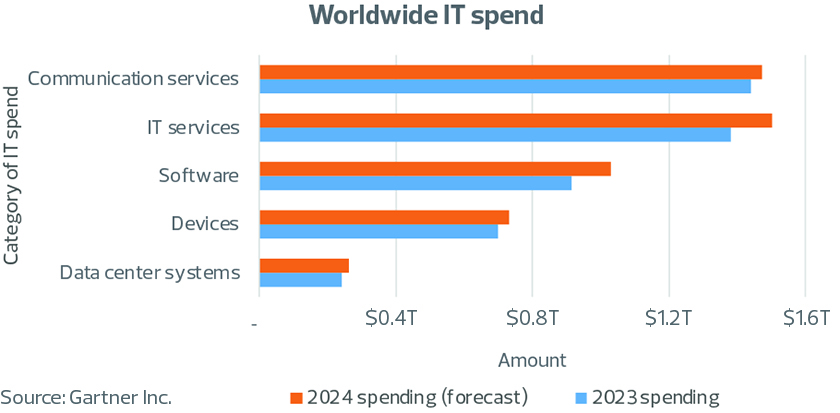Digital transformation and the demand for data are key drivers of the outsourcing trend.
Key takeaways
Outsourcing provides a critical solution for the scarcity of certified public accountants.
Three popular outsourcing models are traditional outsourcing, co-sourcing and lift-outs.
Outsourcing as a business strategy is rapidly becoming the standard across the real estate industry, capturing the attention of executives by providing solutions for tax services, fund administration, property accounting, managed technology, staff augmentation, internal audit and more.
Outsourcing to a third party may result in cost savings, efficiency, scalability, reduced overhead, risk mitigation, technical expertise, technological advancements and protection against turnover, while also helping companies achieve regulatory or financial compliance. While the ultimate responsibility for operational deliverables remains with real estate companies, outsourcing has become an effective strategy to achieve business goals.
Among the factors driving the trend toward outsourcing is the global move toward digital transformation. Real estate investment advisors have prioritized implementing technology tools in response to the call for greater transparency into investment performance and operations. Implemented properly, the right technology will provide clarity of investments and operations, a growing theme across the industry, as highlighted by the U.S. Securities and Exchange Commission’s ongoing efforts to enhance the regulation of private fund advisors.
Further, cybersecurity risk is a constant and evolving battle complicated by the proliferation of generative artificial intelligence, increasing the need for real estate companies to embrace emerging technologies as a means to stay one step ahead of bad actors. As a result, worldwide spending on information technology resources is expected to total $5 trillion in 2024, an increase of 6.8% from 2023, according to the latest forecast by Gartner Inc.

Another driving factor of outsourcing is the growing scarcity of certified public accountants. A catalyst for the decline has been the 150-hour requirement to obtain a CPA license, which was reinstated in August 2008. The correlated increase in student debt, along with modest starting salaries, long hours and required office work, have contributed to waning interest in the accounting profession. The industry is seeking alternative strategies across statutory jurisdictions to help ensure a greater supply of accounting professionals in the future.

Types of outsourcing
Outsourcing, in the traditional sense, is the business practice of engaging a third party to perform functions traditionally done in-house. A common example is when a third party functions as the tax department of a company, taking ownership of all regulatory filings and adding a network of advisors to provide structuring, investment analysis and local or international support. The outsource model for tax compliance enables real-time decision making and expert guidance around real estate transactions.
Besides technical expertise, a primary reason for outsourcing is to gain access to technology that can capture additional data to help companies analyze deals or make investment decisions. Outsourcing may also help companies mitigate cybersecurity risk or streamline a path toward regulatory compliance.
A variation of outsourcing becoming more common in real estate is co-sourcing, in which a company and third-party advisory firm work together to complete a task or function. Co-sourcing is a hybrid model where professional services are outsourced but the technology is insourced. In simple terms, the service provider logs in and utilizes the company’s technology. Common examples include fund administration or financial accounting outsourcing. The real estate industry is no stranger to co-sourcing; however, with evolving regulations, the heightened value of data, and the need for technical experience, the demand for this strategy has soared.
Another variation is a lift-out, which is when a third-party advisory firm hires some of the client organization’s employees to form a professional service delivery team that is already familiar with the company’s culture, operations and business strategy. It’s a win-win scenario because the advisory firm gains access to talent and institutional knowledge while the client organization gains efficiencies and, very often, the ability to shift functional overhead costs to investors.
Considerations for outsourcing
There are business cases that support each outsourcing model described above. Elevated interest rates and increasing salaries, employee benefits, onboarding expenses and placement fees have created challenges for the real estate industry. Depending on a company’s organizational structure and contractual agreements, outsourcing expenses may be pushed through to investors, unlike traditional employment expenses, which are expensed as overhead to the company. Investors often embrace those costs, as outsourcing offers a level of independent oversight and transparency. However, legal organizational agreements may restrict certain types of outsourcing services, and since tax regulations vary by jurisdiction, it’s essential to consult with a professional service provider to ensure compliance.
For many real estate companies, technology integration and the syncing of disparate data can be complex and expensive, but these are critical measures for generating accurate data visuals that support analysis and overall decision making. As a result, it has become increasingly common for property managers or fund administrators to utilize the investment manager’s technology. And while investor demands have grown, the labor market remains challenging. Real estate companies are at risk of losing institutional knowledge from unforeseen turnover while struggling with recruiting skilled talent.
Like the decision to make a real estate investment, the decision to outsource is often aligned with strategic tax and operational benefits.
The takeaway
Like the decision to make a real estate investment, the decision to outsource is often aligned with strategic tax and operational benefits. Outsourcing has become a crucial strategy for real estate companies that risk losing investor trust if they are unable to deliver timely and accurate financial reports The current environment underscores the potential negative impact of operational inefficiencies and cost drivers. Leveraging strategic partnerships to gain operational proficiencies and investor confidence highlights why outsourcing will continue to gain traction among real estate organizations.


